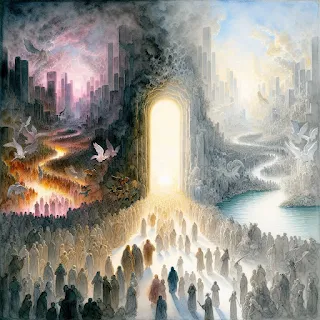Spiritual Nuggets - The Narrow and Wide Gates 10/10/24
Spiritual Nuggets The Narrow and Wide Gates
(Matthew 7:1314)
Thursday, October 10, 2024
(Word Study)
Enter through the narrow gate; for the gate is wide and the way is broad that leads to destruction, and there are many who enter through it. For the gate is small and the way is narrow that leads to life, and there are few who find it.
Matthew 7:13-14 (NASB)
Two roads diverge, both paths made clear,
One paved with light, the other with fear.
The narrow road, though hard and steep,
Leads to life, where joy runs deep.
The broad road calls with ease and pride,
Yet ends in flames where souls reside.
Each step we take must make a choice—
To heed the truth or drown out His voice.
Few will walk the narrow lane,
But in its wake is heaven’s gain.
Stand firm, take heart, embrace the fight,
For Christ awaits in endless light.
—Anonymous
Linguistic and Theological Context
(Understanding Eiseleuo, Stenos, Pleyron, and Apoleia)
In this passage, the words eiseleuo (enter), stenos (narrow), pleyron (wide), and apoleia (destruction) hold critical meaning.
Eiseleuo (εἰσέρχομαι) means "to enter" or "to go in." It implies a deliberate, intentional choice, similar to the way one might gain entry to a selective, restricted space. Jesus speaks of the narrow gate as an invitation to a purposeful journey—one marked by discipline and faithfulness.
Stenos (στενός) translates to "narrow" or "restricted," symbolizing the difficult, constrained path that few will find. Much like the "road less traveled" in modern English, the narrow path represents the disciplined life of following Christ, marked by sacrifice and selfdenial.
Pleyron (πλατύς) means "wide" or "broad," representing an easy, comfortable path that many will choose. The wide road is likened to the "path of least resistance"—appealing and effortless, but ultimately leading to spiritual ruin.
Apoleia (ἀπώλεια) refers to "destruction" or "ruin," indicating the tragic, eternal consequence of choosing the wide, easy path over the narrow one that leads to life.
Historical Context
(Near Eastern Gates and Roads)
In the ancient Near East, city gates held both practical and symbolic significance. Narrow gates were reserved for specific uses or individuals, while broader gates were open to the masses. The narrow gate required careful navigation and effort, much like the spiritually challenging path that Jesus describes.
Similarly, the roads leading to these gates varied in difficulty. Narrow, winding roads were difficult to traverse, while wide, open roads were easier but more prone to leading to areas of danger. Jesus uses this imagery to show the challenge of walking in faith, with the wide road symbolizing the more comfortable yet perilous way of the world.
Theological Significance
(The Choice Between Two Paths)
Jesus' teaching emphasizes the fundamental choice between two ways of living. The narrow gate leads to life—requiring intentionality, faith, and perseverance. The wide gate, though easier to enter, leads to apoleia—spiritual destruction and separation from God.
This passage calls believers to make a deliberate choice. The narrow gate represents the harder, more demanding life of following Christ. Few choose this path because it involves sacrifice and dedication. However, this is the only path that leads to eternal life.
Drawing the Modern Parallel
(Taking the Road Less Traveled)
In modern society, the "wide road" could be seen as the pursuit of materialism, instant gratification, or the acceptance of popular but ungodly values. The "narrow road," by contrast, is the more difficult path of selfsacrifice, humility, and submission to God's will. Just as in ancient times, the easy, wide road might seem appealing, but it leads to ruin. The narrow road, though difficult, is the one that leads to life with God.
Reflection
Jesus’ words in Matthew 7:1314 confront us with a choice: will we choose the wide gate, which promises ease but leads to destruction, or the narrow gate, which requires sacrifice but leads to life? This decision is not just about actions but about our allegiance—are we following Christ or the ways of the world?
In our daily lives, the narrow path is not always easy to choose, but it is always the one that calls us closer to the heart of Christ. Let us be mindful to choose the road that leads to eternal life, knowing that while few will find it, its rewards are far greater than the temporary comforts of the wide road.
Application for Daily Living
(Practical Steps for Walking the Narrow Path)
1. Commit to Daily Obedience
Following Christ means making daily decisions to obey His Word. The narrow path requires discipline and consistency in living out our faith, even when it’s hard.
2. Embrace the Struggle
The narrow road is difficult for a reason—it requires us to confront our sinful nature and turn to God. Embrace this challenge as part of your growth in Christ.
3. Stay Focused on Eternity
Keep your eyes fixed on the eternal reward, knowing that the narrow path, though hard, leads to life. The wide road may offer temporary comfort, but its end is destruction.
4. Seek Accountability
Surround yourself with fellow believers who will help you stay on the narrow path. Community is essential for encouragement and growth, as we walk together in faith.
5. Daily Surrender
Walking the narrow path requires a daily surrender of our will to God’s plan. Trust Him in the difficulties, knowing that He is leading you toward true life.
The message of Matthew 7:1314 is clear: the narrow gate leads to life, but few will find it. The wide road, though easier and more popular, leads to destruction. Let us strive to choose the narrow path, walking faithfully with Christ, and trusting that His way, though challenging, leads to the joy of eternal life.




Comments
Post a Comment